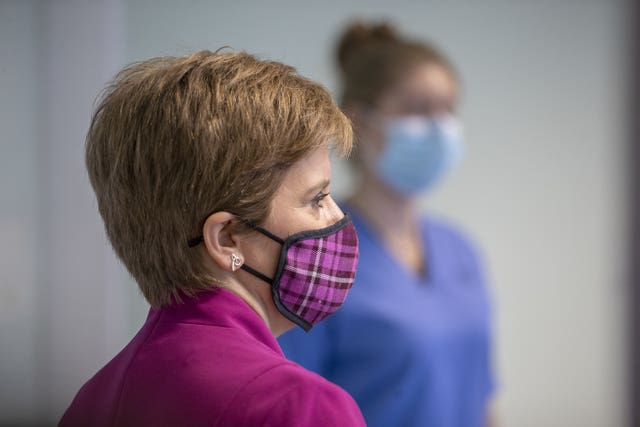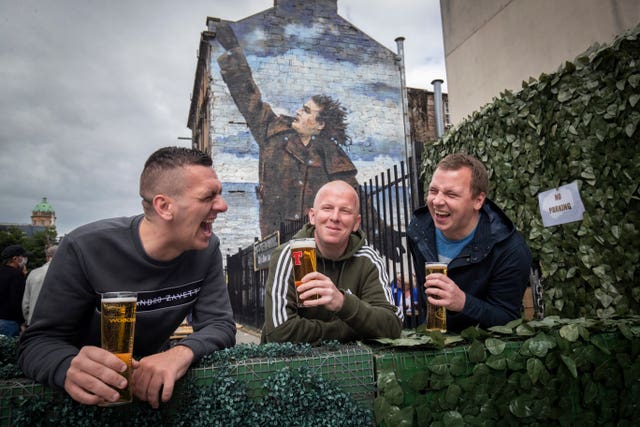
After the first coronavirus case was confirmed on March 1 2020, Saturday marks one year since Scotland’s first death linked to the virus.
Here, The Herald looks at key dates over the past 12 months.
2020
March 13
The first Scottish patient dies after contracting Covid-19, two days after the first case of community transmission is confirmed by chief medical officer Dr Catherine Calderwood.
March 16
National clinical director Professor Jason Leitch says elderly people will not be asked to stay at home, as more schools close and the Scottish Parliament suspends public engagements.
March 18
After two more deaths, all schools close at the end of the week while bus and rail operators reduce timetables.
March 23
As deaths rise to 14 with 499 positive cases, the country enters lockdown and First Minister Nicola Sturgeon calls coronavirus “the biggest challenge of our lifetime”.
 Workers outside the temporary NHS Louisa Jordan Hospital in Glasgow (Ian Rutherford/PA)
Workers outside the temporary NHS Louisa Jordan Hospital in Glasgow (Ian Rutherford/PA)
April 5
Dr Calderwood resigns after being criticised for visiting her second home while telling Scots not to travel.
April 8
The National Records of Scotland’s (NRS) first weekly report shows 354 people have died of Covid-19, higher than previously thought.
April 20
An emergency hospital, the NHS Louisa Jordan, opens at the SEC in Glasgow. Three days later the First Minister warns restrictions could be kept in place for the rest of the year or longer.
May 11
The once-a-day exercise limit is lifted but other restrictions remain in place. A BBC Scotland investigation suggests the virus was in Scotland before March, among Nike delegates at an Edinburgh conference at the end of February.
 Face masks are now commonplace in all walks of life (Jane Barlow/PA)
Face masks are now commonplace in all walks of life (Jane Barlow/PA)
May 26
The Test and Protect strategy is unveiled.
May 29
Scotland enters phase one of its route map out of lockdown with people allowed to meet one other household outdoors.
June 7
No new coronavirus deaths are reported for the first time since lockdown began.
June 19
Phase two of easing lockdown allows people who live alone or solely with under-18s to meet another household indoors without physical distancing in an “extended household”.
June 22/23
Face coverings become compulsory on public transport. Plans for “blended learning” in schools when they return are scrapped.
 Beer gardens reopened as Scotland eased out of the first lockdown (Jane Barlow/PA)
Beer gardens reopened as Scotland eased out of the first lockdown (Jane Barlow/PA)
July 10
Phase three allows up to 15 people from five households to meet outdoors, or eight people from up to three households indoors. Face coverings become mandatory in shops.
July 15
Hairdressers, indoor pubs and restaurants, museums and galleries reopen. Places of worship reopen for communal prayer and congregational services.
August 5
Tough restrictions are reimposed in Aberdeen due to a cluster of cases.
August 11
Pupils return to school.
August 31
Masks become mandatory in secondary school corridors and communal areas. Gyms and swimming pools reopen.
September 1
New restrictions on visiting other households are introduced in Glasgow, West Dunbartonshire and East Renfrewshire.
September 7
These are extended to East Dunbartonshire and Renfrewshire as Ms Sturgeon says the Scottish Government may need to “put the brakes” on easing lockdown.
September 10
Social gatherings are restricted to six people from two households. The Test and Protect app is launched. A day later, household restrictions are introduced in Lanarkshire.
September 25
A ban on indoor household visits and a “strict nationwide curfew” for pubs and restaurants begins.
October 2
SNP MP Margaret Ferrier apologises for travelling to London to debate the coronavirus response in the UK Parliament while experiencing Covid-19 symptoms before testing positive and returning to Scotland.
October 9
Pubs and licensed restaurants in five health boards begin enforced closure amid new restrictions.
October 23
The new five-tier system of restrictions is unveiled with “cautious optimism” from the First Minister. Each council area will be moved into a level of restrictions dictated by prevalence of the virus.
October 29
Ms Sturgeon says the tiers are the country’s best chance of avoiding another national lockdown.
 (PA Graphics)
(PA Graphics)
November 18
NRS figures show more than 5,000 people have died with coronavirus.
November 20
Glasgow, Stirling and Lanarkshire move to Level 4, the highest tier of restrictions.
November 26
The Scottish Government publishes guidance on what restrictions will be eased over Christmas.
 The easing of restrictions over Christmas were swiftly scaled back (Jane Barlow/PA)
The easing of restrictions over Christmas were swiftly scaled back (Jane Barlow/PA)
December 8
The vaccination programme presents the “beginning of the end”, the First Minister says, as the first jabs are given.
December 19
The Christmas “bubble” policy is scaled back with indoor household mixing only allowed on Christmas Day and a travel ban imposed between Scotland and the rest of the UK.
December 23
Ms Sturgeon apologises for breaking coronavirus rules having been photographed not wearing a face mask at a funeral wake.
December 26
Mainland Scotland enters Level 4 for three weeks.
December 31
Ms Sturgeon urges households not to mix on Hogmanay as Scotland records the highest number of new cases since the pandemic began for the third day in a row.
Being back in lockdown is really hard to take for everyone, but it is necessary to slow down this new strain of the virus while we get people vaccinated. Please – for you own safety, that of your loved ones and of the whole country: Stay at Home, Protect the NHS and Save Lives.
— Nicola Sturgeon (@NicolaSturgeon) January 4, 2021
2021
January 4
The Scottish Parliament is recalled. Schools are closed and mainland Scotland returns to lockdown the next day to combat a new, more infectious strain spreading. Scots begin receiving doses of the Oxford/AstraZeneca vaccine.
January 13
A ban on drinking alcohol outdoors in lockdown areas and further restrictions on takeaways are announced.
January 27
The UK death toll passes 100,000. Ms Sturgeon says she is “truly sorry” for mistakes made.
January 28
Large-scale manufacturing of vaccine candidate begins at Valneva in Livingston. If approved, it will deliver up to 60 million doses to the UK by the end of this year.
 (PA Graphics)
(PA Graphics)
February 2
Ms Sturgeon says lockdown will continue until the end of February at least. The UK Government offers to step in and help vaccinate Scots amid claims the programme is “lagging way behind”.
February 4
The daily test positivity rate falls to 4.9% – below 5% which the World Health Organisation (WHO) considers a pandemic to be “under control”. Ms Sturgeon says light at the end of the tunnel is “more visible now than at any point in recent weeks”.
February 9
Travellers landing at Scotland’s airports will be forced to quarantine for 10 days – at their own cost of £1,750 with an additional supplement for each other passenger if not alone.
February 10
Scotland’s vaccination rollout passes the one million mark.
February 16
Ms Sturgeon confirms some secondary school pupils and children in P1-3 will return to face-to-face learning from February 22 – but lockdown continues.
February 23
The First Minister announces the stay-at-home order will remain in place until April 5, however more children could go back to school from March 15. She said it is also expected Scotland will move back to the tiers system from April 26, with all areas initially in Level 3.
 Rangers fans were criticised for celebrating their league win in George Square in March, breaching lockdown rules (Jane Barlow/PA)
Rangers fans were criticised for celebrating their league win in George Square in March, breaching lockdown rules (Jane Barlow/PA)
March 1
One year since Scotland’s first confirmed case.
March 2
Ms Sturgeon confirms plans for school pupils to return to the classroom.
March 6
Health Secretary Jeane Freeman says there is no evidence a Brazilian strain of coronavirus detected in small numbers in the UK has spread.
March 7
Rangers fans are criticised for breaching lockdown rules with celebrations outside Ibrox Stadium and in Glasgow’s George Square as their league title win is confirmed.
March 9
Ms Sturgeon announces restrictions are to ease from March 12, allowing four people from two households to meet outside – with communal worship also to restart.
March 11
As the WHO marks one year since declaring Covid-19 a pandemic, 9,725 deaths have been registered in Scotland where the virus was mentioned on the death certificate.



Why are you making commenting on The Herald only available to subscribers?
It should have been a safe space for informed debate, somewhere for readers to discuss issues around the biggest stories of the day, but all too often the below the line comments on most websites have become bogged down by off-topic discussions and abuse.
heraldscotland.com is tackling this problem by allowing only subscribers to comment.
We are doing this to improve the experience for our loyal readers and we believe it will reduce the ability of trolls and troublemakers, who occasionally find their way onto our site, to abuse our journalists and readers. We also hope it will help the comments section fulfil its promise as a part of Scotland's conversation with itself.
We are lucky at The Herald. We are read by an informed, educated readership who can add their knowledge and insights to our stories.
That is invaluable.
We are making the subscriber-only change to support our valued readers, who tell us they don't want the site cluttered up with irrelevant comments, untruths and abuse.
In the past, the journalist’s job was to collect and distribute information to the audience. Technology means that readers can shape a discussion. We look forward to hearing from you on heraldscotland.com
Comments & Moderation
Readers’ comments: You are personally liable for the content of any comments you upload to this website, so please act responsibly. We do not pre-moderate or monitor readers’ comments appearing on our websites, but we do post-moderate in response to complaints we receive or otherwise when a potential problem comes to our attention. You can make a complaint by using the ‘report this post’ link . We may then apply our discretion under the user terms to amend or delete comments.
Post moderation is undertaken full-time 9am-6pm on weekdays, and on a part-time basis outwith those hours.
Read the rules hereLast Updated:
Report this comment Cancel